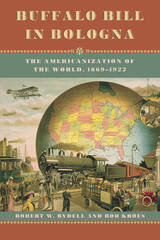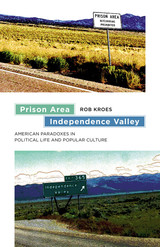4 books about Kroes, Rob

Buffalo Bill in Bologna
The Americanization of the World, 1869-1922
Robert W. Rydell and Rob Kroes
University of Chicago Press, 2005
When it comes to the production and distribution of mass culture, no country in modern times has come close to rivaling the success of America. From blue jeans in central Europe to Elvis Presley's face on a Republic of Chad postage stamp, the reach of American mass culture extends into every corner of the globe. Most believe this is a twentieth-century phenomenon, but here Robert W. Rydell and Rob Kroes prove that its roots are far deeper.
Buffalo Bill in Bologna reveals that the process of globalizing American mass culture began as early as the mid-nineteenth century. In fact, by the end of World War I, the United States already boasted an advanced network of culture industries that served to promote American values. Rydell and Kroes narrate how the circuses, amusement parks, vaudeville, mail-order catalogs, dime novels, and movies developed after the Civil War—tools central to hastening the reconstruction of the country—actually doubled as agents of American cultural diplomacy abroad. As symbols of America's version of the "good life," cultural products became a primary means for people around the world, especially in Europe, to reimagine both America and themselves in the context of America's growing global sphere of influence. Paying special attention to the role of the world's fairs, the exporting of Buffalo Bill's Wild West show to Europe, the release of The Birth of a Nation, and Woodrow Wilson's creation of the Committee on Public Information, Rydell and Kroes offer an absorbing tour through America's cultural expansion at the turn of the century. Buffalo Bill in Bologna is thus a tour de force that recasts what has been popularly understood about this period of American and global history.
Buffalo Bill in Bologna reveals that the process of globalizing American mass culture began as early as the mid-nineteenth century. In fact, by the end of World War I, the United States already boasted an advanced network of culture industries that served to promote American values. Rydell and Kroes narrate how the circuses, amusement parks, vaudeville, mail-order catalogs, dime novels, and movies developed after the Civil War—tools central to hastening the reconstruction of the country—actually doubled as agents of American cultural diplomacy abroad. As symbols of America's version of the "good life," cultural products became a primary means for people around the world, especially in Europe, to reimagine both America and themselves in the context of America's growing global sphere of influence. Paying special attention to the role of the world's fairs, the exporting of Buffalo Bill's Wild West show to Europe, the release of The Birth of a Nation, and Woodrow Wilson's creation of the Committee on Public Information, Rydell and Kroes offer an absorbing tour through America's cultural expansion at the turn of the century. Buffalo Bill in Bologna is thus a tour de force that recasts what has been popularly understood about this period of American and global history.
[more]

If You've Seen One, You've Seen the Mall
EUROPEANS AND AMERICAN MASS CULTURE
Rob Kroes
University of Illinois Press, 1996
The Dutch scholar Rob Kroes argues that American culture is "modular,"
continually fragmenting, disassembling, and reassembling itself--and in
the process creating something new. In a series of topical essays that
show why he is one of Europe's leading authorities on American culture,
Kroes probes trends in American advertising, the image of the Vietnam
war in American films, the implications of American vernacular culture as represented in rap music, and other topics.
continually fragmenting, disassembling, and reassembling itself--and in
the process creating something new. In a series of topical essays that
show why he is one of Europe's leading authorities on American culture,
Kroes probes trends in American advertising, the image of the Vietnam
war in American films, the implications of American vernacular culture as represented in rap music, and other topics.
[more]

Prison Area, Independence Valley
American Paradoxes in Political Life and Popular Culture
Rob Kroes
Dartmouth College Press, 2015
The study of prisons brought Tocqueville to America. For Rob Kroes, one of Europe’s most distinguished authorities on contemporary American culture, it was rather the other way around. For Kroes, it was deep knowledge of American culture that brought him back to America and face to face with a couple of highway signs, Tocquevillian in their portent, that invited motorists to exit from Interstate 80 in Nevada toward a place called Independence Valley and to keep their eyes open for a “Prison Area.” In this collection of essays, Kroes invites us to take these two signs seriously for their capacity to deepen our insights into America’s cultural contradictions, especially how, after the September 11, 2001, attacks on the World Trade Center and Pentagon, the US government’s response altered the meaning of America for Americans and Europeans alike. The author’s fascination with the myriad ways in which America changes face, from hard power to soft, from uses of force to the power of entertainment, but always holding the attention of publics across the globe, is what ties his work together. The essays here touch on diverse topics such as photography (“Falling Man” and Holocaust imagery), music (in Broadway and Hollywood musicals), film (Django Unchained), American exceptionalism (in an interesting counter to dog-eared dogma), and the difficulties of the first “white president of color.” Like his predecessors, Tocqueville and Johan Huizinga, Kroes offers a clear-eyed assessment of America on the ground, love it or hate it. This readable and sharp-penned critique of America and American culture and power will appeal to Americanists across a broad swath of disciplines.
[more]

Them and Us
Questions of Citizenship in a Globalizing World
Rob Kroes
University of Illinois Press, 2000
At the dawn of the twenty-first century, all of us consider ourselves to be citizens of something-–but of what? Nation-states? Regions? Ethnic groups? Corporations?
An accomplished set of meditations by one of Europe's leading Americanists, Them and Us is a rich comparative study of European and American cultural traditions and their influence on conceptions of community. In contrast with the ethnic and nationalist allegiances that historically have splintered Europe, Rob Kroes identifies a complex of cultural practices that have mitigated against ethnically rooted divisions in the United States. He argues that the American approach–-articulated by a national rhetoric emphasizing openness rather than closure, diversity rather than uniformity--has much to offer a Europe where the nationalist and ethnic conflicts that spawned two world wars continue to sow terror and destruction.
Kroes discusses European and American attitudes toward the welfare state, the human rights tradition in the United States, and the role of regionalism in shaping conceptions of national identity. He also considers new, transnational forms of cultural membership that are emerging to take the place of nation-based citizenship. He contends that the frame of reference Europeans now use to make sense of their collective situation draws on ingredients provided by the worldwide dissemination of American mass culture. He investigates the way this emerging world culture, under American auspices, affects the way people in their local and national settings structure their sense of the past and conceive of their citizenship.
Imagining a new set of cultural relationships that could serve as the basis for global citizenship, Them and Us is an insightful consideration of the types of solidarity that might weave humankind together into a meaningful community.
An accomplished set of meditations by one of Europe's leading Americanists, Them and Us is a rich comparative study of European and American cultural traditions and their influence on conceptions of community. In contrast with the ethnic and nationalist allegiances that historically have splintered Europe, Rob Kroes identifies a complex of cultural practices that have mitigated against ethnically rooted divisions in the United States. He argues that the American approach–-articulated by a national rhetoric emphasizing openness rather than closure, diversity rather than uniformity--has much to offer a Europe where the nationalist and ethnic conflicts that spawned two world wars continue to sow terror and destruction.
Kroes discusses European and American attitudes toward the welfare state, the human rights tradition in the United States, and the role of regionalism in shaping conceptions of national identity. He also considers new, transnational forms of cultural membership that are emerging to take the place of nation-based citizenship. He contends that the frame of reference Europeans now use to make sense of their collective situation draws on ingredients provided by the worldwide dissemination of American mass culture. He investigates the way this emerging world culture, under American auspices, affects the way people in their local and national settings structure their sense of the past and conceive of their citizenship.
Imagining a new set of cultural relationships that could serve as the basis for global citizenship, Them and Us is an insightful consideration of the types of solidarity that might weave humankind together into a meaningful community.
[more]
READERS
Browse our collection.
PUBLISHERS
See BiblioVault's publisher services.
STUDENT SERVICES
Files for college accessibility offices.
UChicago Accessibility Resources
home | accessibility | search | about | contact us
BiblioVault ® 2001 - 2024
The University of Chicago Press









